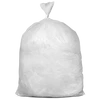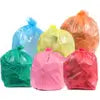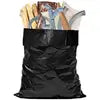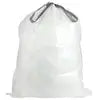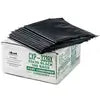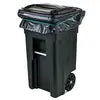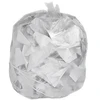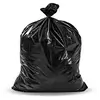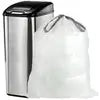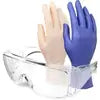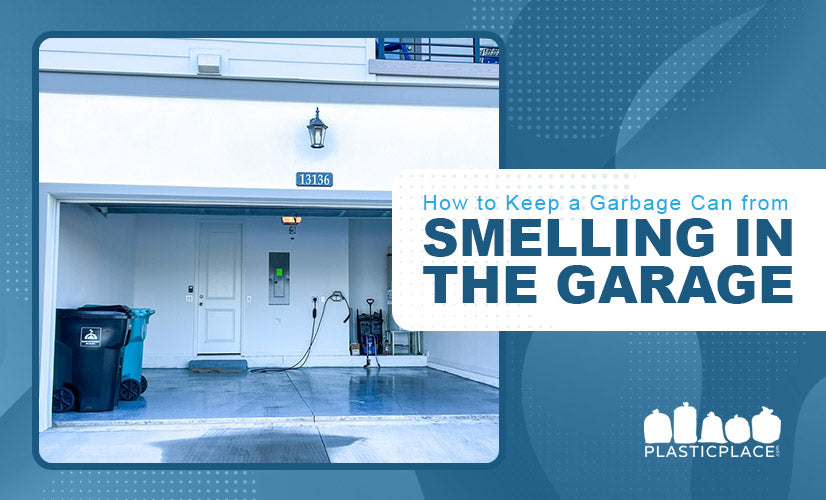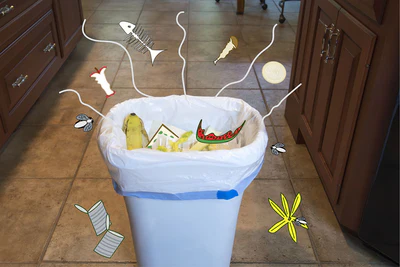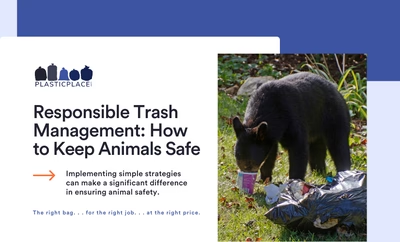Have you noticed bad smells as you pass through your garage lately? Maybe it’s a whiff as you get into your car, or something that makes you wrinkle your nose as you’re bringing the groceries in. The culprit might be right in front of you: Those huge rollaway garbage cans that you store in your garage.
In many homes, the garage is the logical place to store your large outdoor trash cans. It helps prevent raccoons and other animals from getting into the trash, and it allows you to take a trash bag out without walking outside. Unfortunately, storing a garbage can in any enclosed space also makes it more likely that the garbage will emit bad smells that linger and circulate through the air.
However, there are several easy ways to control unpleasant scents from a garbage can and make your garage a more pleasant place to be. So, why do garage trash cans often smell so bad and how to keep a garbage can from smelling in the garage?
What Causes Garbage Cans to Smell in a Garage.
Why is the smell of garbage often so persistent and so strong in the garage? It’s not because “garage” and “garbage” are one letter apart, although that similarity is definitely one of those things that seems almost too convenient. (A quick hat tip to the person who proofread this article and had to distinguish between “garage” and “garbage” dozens of times!)

Garbage odors come from the process of decomposition. The processes of rot and decay that affect all organic material are always at work in your garbage, but especially for substances like food scraps, pet waste and used diapers. As bacteria break down the organic products in these items, they release odorous compounds that make these substances some of the most frequent culprits when it comes to foul smelling garbage cans.
Often, these waste items collect in the large rollaway garbage cans that people keep in their garages. The rollaway cart is where most or all of your home’s garbage ends up, and it often also collects the worst-smelling trash that nobody wants in the house. When all of this garbage accumulates in the cart, the result is a lot of foul-smelling, decomposing material in one place.
On top of that, in warm weather, your garage probably gets considerably hotter than the rest of your home, since most garages aren’t air conditioned. The heat speeds up the decomposition of the waste in your garbage can, which means more odors are being released. That’s why the smell of garbage in a garage often tends to get worse during the summer.
Other Things That Could Make Your Garage Smell
While trash is often to culprit, as a friendly side note, ts there are other possible odor causing culprits to consider. Be aware of these other reasons for bad smells and consider whether any might be at work in your garage.
- A sewer line might be emitting sewer gas smell into your garage. If you notice a strong and consistent sewer smell, consult a plumber to discuss whether sewer gas from a leaking pipe might be responsible.
- On a similar note, if your garage has a drain in the floor, it might be clogged with dirt and grime. Check your drain for clogs, as these can cause the drain to back up and emit unpleasant scents.
- If the smell has a strong resemblance to rotten eggs and your garage is near a natural gas line, it could be a gas leak. Know the signs of a gas leak and contact your gas company immediately if you suspect one, as these leaks can cause asphyxiation and explosion hazards.
- An animal, such as a rat, raccoon, skunk or stray cat might be living in or around your garage. Animal waste can cause bad smells in garages, and an animal that passes away near your garage can cause an especially strong odor that might persist for weeks. Check hidden areas like crawlspaces and attics to learn if you might be harboring a furry fugitive somewhere.
How to Keep a Garbage Can from Smelling in the Garage
You don’t have to accept a bad-smelling garbage can in your garage. Now that we understand some of the reasons a garbage can might smell in the garage, it’s time to talk about the solutions. Use these tips to eliminate garbage can odor in your garage.

1. Avoid throwing garbage into the bin without a bag.
Many of us have tossed a piece of unbagged garbage into our garbage cans before without a thought. But it’s a lot easier to keep your garbage cans clean and sanitary if everything in your can is inside a garbage bag.
The reason is that bags don’t just keep garbage in — they also help contain the smells that the garbage emits. Anything that isn’t in a bag will emit its smells whenever you open the can. While it might be convenient to put that watermelon rind or the remains of the Thanksgiving turkey directly into the rollaway cart, you’ll regret it once they begin to decompose.
Thus, it’s smart to always try to bag whatever you throw in the garbage, particularly if it’s kitchen trash that will smell as it decomposes. If you often need to quickly bag small amounts of garbage, consider picking up some small trash bags.
2. Use tough, leak proof garbage bags.
Thickness matters a lot when it comes to choosing garbage bags. Thinner bags are significantly more prone to leakage and tearing, which means little streams of who-knows-what trickling out of the bags and into your garbage cans, where they can quickly create undesirable smells. It can also mean getting surprised by a bursting bag as you carry out the trash, which we trust isn’t on anybody’s list of enjoyable experiences.
When searching for garbage bags, you’ll probably come across references to “high density” and “low density” trash bags. The terminology can be confusing because “low density” bags are actually thicker, more durable and more suitable for heavy-duty applications. Look for low density polyethylene garbage bags with a drawstring top to seal odors in even more.
Our classic black trash bags, made from thick low-density plastic, are very strong and more than sufficient for most households’ waste disposal needs. However, if you find that you frequently need to dispose of extremely heavy trash, make sure to pick up some contractor trash bags. These bags are made from ultra-thick and rugged plastic that provides the durability you need.

3. Give your garbage cans a thorough, regular cleaning.
It’s easy for a garbage can to accumulate all sorts of grime inside. That’s why it’s important to regularly give your garbage cans a deep clean. Businesses with a lot of garbage cans sometimes hire professional garbage can cleaners to do their garbage cans, but if you know how to clean a trash can, it’s easy to make it a DIY job.
The easiest way to clean a garbage can is with a hose, some dish soap and white vinegar. Give the can a good scrub with a solution of vinegar, dish soap and warm water and make sure to scrub off any solid materials that have caked onto the inside of the trash can. (A long-handled cleaning sponge will help!) When you’re done, rinse the can thoroughly with a hose.
Remember to clean out your recycling bin regularly, too. Many people think that recycling bins are cleaner than trash cans, but since you shouldn’t bag your recyclables in most places, it’s easy for the bins to accumulate drippings from containers. You can clean recycling bins with the same method as trash cans, so why not get them done while you’re at it?
Trash Can Rubber Bands Prevent Garbage from Ruining the Can
4. Secure your garbage bags to the can with rubber bands.
Ever had a heavily loaded trash bag start slipping down into the can? It’s definitely no fun, both because it requires reaching down into the garbage to pull it up and because it can spill substances from the garbage all over the inside of your garbage can. Once that happens, your garbage can is on its way to an offensive smell.
Trash can rubber bands are the ingeniously simple solution to this problem. These large rubber bands fit over the top of your trash can and hold the liner firmly in place. They’re designed to fit all sizes of trash cans and trash bags, even the enormous 96-gallon trash bags that many people use in their rollaway carts. One way to protect your rollaway cans is to line it with a 95- to 96-gallon trash bag that will preserve the can and prevent odors. After a few weeks or months, you can replace the liner when the can is empty for a new one to further prevent smells.
5. Put food scraps into a compost or garbage disposal rather than household trash.
Reducing the amount of food scraps in your garbage is another great way to reduce odors. Many of the food scraps that a household generates can go either into a garbage disposal or a compost. Both are excellent ways to bypass the potential smell problems that food scraps can cause in a garage trash can.
If your home has a garbage disposal, you can put many different types of food scraps into it. The disposal grinds and pulverizes the food and then sends it out of your home via a waste disposal line. It’s an excellent way to keep some of the worst smelling garbage out of your garbage cans, although you should be aware of some garbage disposal dos and don’ts.
Composting is another way that many homes dispose of food waste, and it has the added advantage of being eco-friendly and useful to gardeners. There are various methods of composting, but all use the power of natural decomposition to break down common kitchen scraps into a rich, nutritious fertilizer. However, like garbage disposals, it’s important to know what you can and can’t put in compost.
6. Use trash can deodorizers to combat odors.
Trash can deodorizers will help you prevent odors from accumulating in your garbage cans. Commercial trash can deodorizer products are available, but it’s a lot faster and cheaper to do it yourself.
What’s the secret? It’s actually quite easy. After you’ve cleaned and dried the trash can, and before you put any trash or trash bags into it, sprinkle a handful of baking soda or cat litter into the bottom of the can. These substances are excellent at absorbing liquids and odors, and they’ll help keep those liquids and odors on the bottom of the trash can rather than drifting through the air.
7. Don’t overfill trash bags or cans.
Cramming too much garbage into your trash bags, or too many bags into a bin, is another practice that can make trash odors worse. Overfilling a trash bag makes it more likely to rupture, and ruptures mean leaks that cause odors. It’s also possible to overfill a rollaway cart by placing too many bags inside it, which pushes the lid up and allows odors to escape the bin.

Of course, you still want to get the most value possible from your garbage bags. That’s why many people choose to buy a garbage compactor for their home. These useful machines compress trash into a smaller form that takes up much less space in the can. However, if you have a compactor, remember to purchase special compactor trash bags that can withstand the compactor’s force.
Order Your Black Trash Bag Box and Save!
Additionally, if you find that you frequently run out of room in your bins, consider requesting an extra one from the organization that provides waste disposal in your area. It’ll help you handle large amounts of trash and reduce the chance of overfilling your trash cans.
8. Use a fan to improve air circulation in your garage.
The hot and stagnant air inside a garage can easily create an unpleasant atmosphere when it mingles with the scent of garbage. Adding a fan to your garage will help circulate the air and dissipate the smells more quickly, and it will often create an overall more pleasant feeling in the room, too.
A box fan is usually the most economical choice for aerating your garage, but mounting a fan on the ceiling or wall is also a popular option. If your garage has windows, you can leave some open to further improve circulation.
Plasticplace.com is the fastest and easiest way to get the garbage bags you need. We have garbage can liners for every room of your home and business, from heavy duty 96-gallon trash bags for your rollaway carts to 4-gallon trash bags for the office wastebasket.
Questions? Our customer service experts are happy to help — call 877-343-2247 for assistance with your order. We’ll help you find the best garbage bags for your needs, and our fast delivery will ensure that they make it to your home right on time.
Image Credits:
INGARA/Shutterstock.com
Joni Hanebutt/Shutterstock.com
Barry Paterson/Shutterstock.com
Neptunestock/Shutterstock.com
Andrii Zastrozhnov/Shutterstock.com
 4.9 out of 5
4.9 out of 5 












